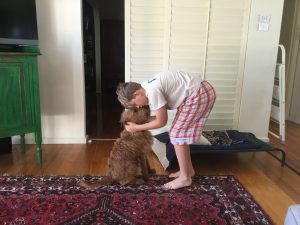 Media release 4 October 2017
Media release 4 October 2017
Australia has one of the highest rates of pet ownership in the world, with 62% of Australian households owning pets. But pets can share more than their love with the rest of the family so the Food Safety Information Council and Animal Medicines Australia have released some pets and food safety advice today.
Rachelle Williams, Food Safety Information Council Chair, said that most of us consider pets to be part of the family and, in return, having a pet has been shown to have positive health benefits. Studies show owning a pet can reduce stress, increase rates of exercise and even reduce the incidence of allergies and help strengthen the immune system in children exposed to pets in early childhood.
Animal Medicines Australia Executive Director, Ben Stapley, said hygienic practices, such as washing your hands after cleaning up after your pet, reduces the risk of illnesses from germs that can be shared between us and our pets. Staying healthy means you will be able to continue enjoying the many benefits of pet ownership and continue caring for your family member.
Here are 6 simple tips about how to avoid infections from your pets:
- Always take your pet for regular health check ups with your vet and make sure they are fully immunized, wormed, and have had flea and tick treatments.
- Try to keep pets out of areas where you are preparing food, especially away from kitchen benchtops. As always, wash you hands with soap and dry thoroughly before handling food and after handling your pet, their food or toys. Don’t let your pets lick or take food from your plate.
- Responsible pet ownership involves a lot of picking up poop, which can transfer bacteria to your hands. Always wash your hands after cleaning out cages, fish tanks and cat litter and after picking up after your dog.
- Pet birds, including your backyard chooks, and reptiles have been linked to salmonella infections in people. Make sure you and your children wash your hands after handling them or cleaning their environment.
- Cats may pass on salmonella infections if they eat raw meat or eat wild birds or animals. It is best to feed them commercially prepared food and try to keep them inside.
- It’s great to for your children to have contact with farms animals at petting zoos or farms but there have been cases of illness. You can avoid this by making sure you or your child don’t eat or drink in animal areas, washing your hands (or using hand sanitiser) after touching farm animals and not bringing children’s toys, cups into animal areas.
For more information see Food safety and pets fact sheet
Media contacts:
| Lydia Buchtmann
Communications Director Food Safety Information Council 0407 626 688 |
Ben Stapley
Executive Director Animal Medicines Australia 0436 191 011 |
